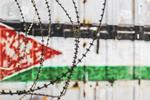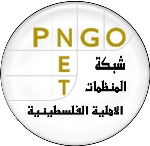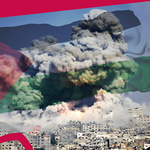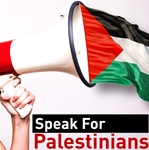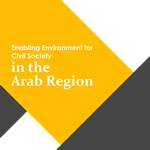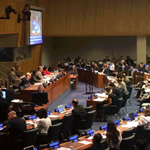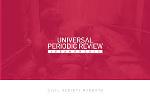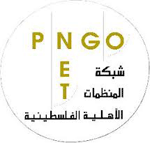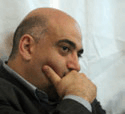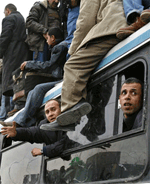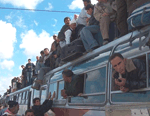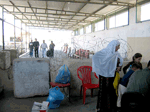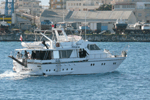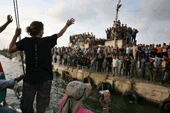Palestine
The impact of the occupation and pandemic on Palestinian workers
Published on Tue, 2021-05-11 14:14
Arab NGO Network for Development (ANND) strongly condemns the attacks on defenseless Palestinians in Jerusalem and its neighborhoods, especially the attempt to uproot the residents of Sheikh Jarrah, calls on the international community to launch the broadest solidarity campaign with the Palestinian people and provide international protection for defenseless citizens in implementation of international laws, especially the Geneva Convention. |
Published on Thu, 2020-05-14 12:11
The COVID-19 health crisis added to the multidimensional crises in the Arab region and their manifestation in conflicts, wars, economic and social inequalities, and the increasing number of refugees and migrants. It could lead to severe repercussions at the economic, social, and political levels. According to an ESCWA preliminary estimate, the region will lose at least USD42 billion in 2020 due to the Corona pandemic. ESCWA also considered that the global spread of the virus and the growing impact of low oil prices could aggravate income losses. Unemployment is expected to increase by 1.2 percentage points, meaning the loss of around 1.7 million jobs. The Arab region registers some of the highest rates of inequality around the world, and informal employment accounts for 50% of jobs. It also lacks universal social protection systems and is thus unable to protect workers and ensure their dignity during work stoppages. |
Published on Tue, 2020-02-04 22:27
Arab NGO Network for Development (ANND) issues a statement on the ‘Deal of the Century’ and recalls that an immediate end to Israeli occupation and the recognition of the universal, indivisible and inalienable Palestinian Rights are the foundations of a sustainable Peace in the Middle East. On January 28th, 2020 the Middle East Peace Plan known as the Deal of the Century was presented by the US President Donald Trump in Washington DC. A “peace” plan that was built unilaterally and that considers the Israeli occupation as the exclusive partner. The “peace” plan markets an illusion of peace at the expense of Palestinian people’s rights and dignity. It gives further impunity to all human rights violations committed by the Israeli occupation, including through legalizing illegal Israeli settlements. |
Published on Mon, 2019-07-15 11:43
PNGO Network, Social Watch member in Palestine, issued a paper entitled “The Impact of Current Situation on Women Protection in the Gaza Strip” The paper highlights the effect of the protracted crises in the Gaza Strip on women who become shock-absorbers during crisis. Also, it illustrates the key barriers impede the work of national women organizations to intervene in women protection and addresses the required steps from varies parties to achieve women protection in Gaza. |
Published on Thu, 2019-05-09 20:14
The Palestinian Non Governmental Organizations Network (PNGO) calls upon the international community to immediately pressure the Israeli occupying forces to stop attacks on the Gaza Strip. PNGO condemns the Israeli occupying forces continuous barbaric attack on Palestinian civilians especially children, women, civilian homes, cultural institutions and media outlets. Urgent Call for Action PNGO calls upon the international community to immediately pressure the Israeli occupying forces to stop attacks on the Gaza Strip Palestinian Non Governmental Organizations Network (PNGO) condemns the Israeli occupying Forces continuous barbaric attack on Palestinian civilians especially children, women, civilian homes, Cultural institutions and media outlets. |
Published on Mon, 2019-02-18 11:59
In Palestine, the main obstacle to realizing the SDGs is the occupation that continues to confiscate lands and, as reported by UNCTAD, deny Palestinians the human right to development. The indicators are alarming: unemployment has reached 27.7 percent in the Palestinian territories occupied in 1967 and 44 percent in the Gaza Strip. The poverty rate for the year has reached 29 percent in 2017 and it is 53 percent in the Gaza Strip, reflecting the catastrophic effect of the 10-year ongoing blockade. |
Published on Fri, 2018-08-17 12:15
With over a 50 year stuggle under Israeli occuptation, Palestinians’ call for the right to self-determination is not something new. Systematic and gross human rights violations they face neither. They are daily realities for Palestinians; while their country is now being defined as “least desirable, the least inviting and the least livable place on earth1”. However their struggle for freedom is constant. In each and every occasion they call for an immediate end to occupation and blockade of the Gaza Strip and the ethnic cleansing in Jerusalem and other places in West Bank. They urge Israeli authorities to respect all United Nations resolutions and its obligations under international law recognizing their right to self-determination. Civil society activists and human rights defenders are at the forefront becoming a voice for these calls. They advocate for international solidarity and action as well. |
Published on Wed, 2017-09-27 15:09
The Arab NGO Network for Development (ANND) launched a book on the enabling environment of civil society in the Arab region. The publication aims to present an overview of the current situation of civil society organizations in Tunisia, Egypt, Lebanon, Iraq, Syria, and Palestine. It uses several country-specific indicators regarding the establishment of civil society organizations and their success. The current conflicts raging in the Arab region constitutes a serious challenge, especially in lack of attention to laws regarding the work of civil associations, in addition to the shifts faced in funding. The publication highlights several legal challenges, especially those resulting from the lack of commitment to the principles of the separation of powers, as applied by democratic societies, as laws and regulations are often politicized. The book includes several recommendations to invigorate the work of civil society organizations in the regional, in order to consolidate the values of justice, equality, and sustainable development. |
Published on Thu, 2017-08-31 12:30
Following 8 days involving 43 Voluntary National reviews (VNR) and 147 side events with 77 ministry-level participations and 2458 registered stakeholder representatives, the statistical outlook of the 2017 High-Level Political Forum on Sustainable Development Goals is quite promising. It is only the second review and just two years after the kick-off for the implementation of a universal agenda towards leaving no-one behind. Yet, time is marching on and there is a long way to go on the level of implementation. At the 2017 HLPF, Jordan became the third country from the Arab region to participate in the VNR process; following Egypt and Morocco in the 2016 review. The first words of Jordan’s national report made reference to the same issues: ‘the power of working together’ and taking into consideration ‘the urgent world issues’. |
Published on Fri, 2016-03-25 11:14
The United Nations Special Rapporteur on the situation of human rights in the Palestinian territories occupied by Israel since 1967, Mr. Makarim Wibisono of Indonesia, has stressed the critical need for the international community to increase its protection of the Palestinian population. Mr. Wibisono, who has resigned because of Israeli non-cooperation with his task, while presenting his final report to the Human Rights Council, recalled the well-documented violations related to the Israeli occupation policies and practices in the Occupied Palestinian Territory (OPT), and appealed to the Government of Israel, as the occupying power, to take practical steps to implement protections under international law as it pertains to the Palestinian population living under occupation. |
Published on Mon, 2015-11-16 13:59
During the 23rd Working Group session of the Universal Periodic Review the situation of human rights in Lebanon were reviewed by the UN member states. During the interactive dialogue several member states directed recommendations to Lebanese Delegation headed by Permanent Representative of Lebanon to UN Mission in Geneva Mrs. Najla Riachi Assaker on the issues of women’s rights, torture, migrant workers, establishment of a moratorium on the death penalty. Three and a half hour session provided the occasion for both national delegation representatives and the UN Member states to shed light on the ‘extraordinary challenges’ the country is facing, namely the Syrian crisis and the terrorism in the neighbourhood. Unfortunately as civil society groups engaged in the UPR process and working on issues of human rights and development, we believe that these challenges cannot be ‘excuses’ for non-implementation of recommendations accepted back in 2010 and in overall providing maximum available resources for ensuring the full enjoyment of human rights in the country. |
Published on Sat, 2015-09-12 07:48
The Palestinian Non-governmental Organizations Network (PNGO) raised concerns and warned of a dangerous deterioration in the humanitarian situation in the Gaza Strip due to severe drop-long power cuts caused by the fuel outage. PNGO stated that power outage in the besieged Gaza Strip seriously affects basic life facilities in particular health,water, education and sanitation as well as vital sectors. PNGO demanded the international community and Arab and Palestinian parties as well to immediately carry on their responsibility to find real time and strategic solutions to the power cut offs in the Gaza Strip. |
Published on Tue, 2014-12-23 09:28
For the fourth successive year, a delegation of human rights and development civil society organizations from the Arab region will be visiting the European institutions in Brussels between the 8th and the 12th of December 2014. The Arab delegation includes civil society representatives from Egypt, Jordan, Palestine, Morocco, Syria, Tunisia and Lebanon. This visit seeks to provide a platform for dialogue and exchange between civil society organizations from the Arab region and European policy makers at the Parliament and Commission around the EU’s support and involvement in the region. |
Published on Thu, 2014-09-04 18:43
A new article produced by Mohsen Abu-Ramadan, the President of the Palestinian NGO Network (PNGO) in Gaza. The article describes “the horror of the aggression and its negative impact on all aspects of life” which compelled the authorities to announce Gaza a disaster zone. Moreover, the article calls for “Emergency interventions by the authorities, international organizations, and UN agencies” to ensure an active and dynamic mobilization to address the effects of the aggression on the various social and economic sectors. |
Published on Thu, 2014-08-14 19:45
Social Watch calls on the international community to declare the Gaza Strip as an "international humanitarian disaster zone", as requested by the Palestinian NGOs. The flow of humanitarian assistance needs to be accelerated and civilians need to be protected. "The recurrence of these episodes in Gaza -says the Social Watch statement- is the result of not having acted before on similar war crimes and of not having pursued with good faith negotiations towards a lasting peace. The current ceasefire has to be maintained and the international community should back it proactively. |
Published on Wed, 2014-08-13 11:07
Palestinian NGOs Network (PNGO) called on the international community and the United Nations (UN) to speed up implementation of declaration of Gaza Strip a 'humanitarian disaster zone'. PNGO demanded to ensure the flow of all forms of humanitarian aids as well as evacuate the injured and secure a protection for the civilians, in the light of the continuing Israeli offensive and its repercussions on the initially deteriorated humanitarian situation in the besieged Gaza Strip. The Palestinian NGOs Network (PNGO) on Tuesday 12, held a press conference at Gaza's Al-Shifa Hospital Compound, with participation of each of Chairman of the Board of the Palestinian NGOs Network, Mohsen Abu Ramadan, and member of the Palestinian NGOs Network's Administrative Board, Tayseer Muheisen, and Director of PNGO Amjad Al-Shawa. |
Published on Fri, 2014-07-18 10:59
The Palestinian NGOs Network "PNGO" addresses Mr John Gatt-Rutter, EU Representative to Palestine, while Israeli occupation offensive against the Palestinian people continue and in the light of the occupation's aerial, naval and artillery bombardment of the Palestinian houses and civil society organizations in the Gaza Strip, that left more than two hundred martyrs most of whom are children, women and elders and displaced hundreds of families leaving them with a shelter after destroying their houses, as well as destroyed agricultural lands, fishing boats, factories, and civil society organizations. |
Published on Fri, 2014-07-11 11:56
Palestinian Non-Governmental Organizations Network (PNGO) calls on the international community and the Secretary-General of the United Nations Ban Ki-Moon to provide an immediate international protection to the Palestinian people and exert immediate and urgent efforts to stop the Israeli occupation's aggression in the Gaza Strip. PNGO warns that the Israeli occupation totally ignores the international conventions and treaties including the Fourth Geneva Convention by committing horrible crimes against the Palestinian civilians by targeting their houses using war jets, artilleries and gunboats in the light of the Israeli tight siege on the Gaza Strip. |
Published on Thu, 2013-11-07 11:06
The Palestinian Non-governmental Organizations Network PNGO raised concerns and warned of a dangerous deterioration in the humanitarian situation in the Gaza Strip due to severe drop-long power cuts caused by the fuel outage. PNGO stated that power outage in the besieged Gaza Strip seriously affects basic life facilities in particular health , water, education and sanitation as well as vital sectors. |
Published on Fri, 2012-12-14 08:35
The military raid on the offices in Ramallah of the Palestinian NGO Network (PNGO, member of Social Watch), Women’s Union and Addameer “adds to the Israeli record of continuous violation” of the international humanitarian law and human rights treaties, and proved once again that the occupation “is the major (…) obstacle” that prevents the Palestinian society from reaching its development, stated the Arab NGO Network for Development. |
Published on Wed, 2012-07-11 08:53
Amjad al-Shawwa of the Palestinian Non-Governmental Organizations Network (PNGO, focal point of Social Watch in the occupied territories) says the Israeli regime is responsible for the deteriorating sanitary conditions in the besieged Gaza Strip, Press TV reported. |
Published on Wed, 2012-05-02 08:00
Israeli keeps on putting pressure on fishermen in the Gaza Strip at the height of the fishing season. Nearly a dozen Palestinian fishermen were arrested by Israeli forces off the coast since mid-April. The Palestinian NGO Network (PNGO, focal point of Social Watch in the occupied territories) warns that those Israeli policies are worsening the humanitarian situation in Gaza. |
Published on Tue, 2012-04-24 09:01
The “Arab Uprisings” and the civil society in the Arab region have a relevant role on campaigning and advocating to end the Israeli occupation and on support for building an independent Palestinian state, said Ziad Abdel-Samad, director of the Arab NGO Network for Development (ANND, a member organization of Social Watch), participating in a discussion on ‘Sustaining the Palestinian Economy Under Occupation: the Role of Arab Cooperation,’ organized last week by Unctad’s Assistance to the Palestinian People Unit in Doha. |
Published on Wed, 2011-08-24 08:51
Sources: Arabic Network for Human Rights Information, UN News Centre. Eleven Egyptian human rights organizations condemned this week the Israeli attacks against the civil population of Gaza and against Egyptian military personnel in the last days, and demanded that the U.N. Security Council conduct "a fair investigation" with the aim to "bring those responsible to trial". One of the signatory groups is the Egyptian Association for Community Participation Enhancement, focal point of Social Watch. |
Published on Thu, 2011-08-11 07:21
Source: International Solidarity Movement Dozens of Arab and international organizations and leading personalities have joined this week an urgent call launched from Gaza to permanently re-open the Rafah crossing between Gaza and Egypt, which remains tightly restricted despite the fall of Egyptian President Hosni Mubarak in February. |
Published on Tue, 2011-07-12 08:04
Source: PressTV: http://bit.ly/mQW8F2 The Palestinian Non-Governmental Organizations Network (PNGO, focal point of Social Watch) warned about a rise in the number of residents in Gaza looking for medical treatment in the West Bank who are arrested by Israeli forces at the Erez crossing. |
Published on Tue, 2011-07-05 07:57
Sources: WAFA, Petra, Palestine Chronicle. The Palestinian Non-Governmental Organizations Network (PNGO), which represents hundreds of civil society organizations and is a focal point of Social Watch, condemned in a statement issued this Saturday the Greek government decision of banning a ship travelling with the Freedom Flotilla II from sailing to Gaza, describing it as “unfortunate.” |
|
Published on Fri, 2011-06-17 09:43
Sources The human rights organisation Al-Haq expressed its grave concern about a surge of the violence against the Palestinian population of the West Bank. The arson of a mosque in the village of al-Mghayyer committed by local Jewish settlers last week is part of the ongoing trend, intensified by the impunity, warned this group based in Ramallah and member of the Palestinian NGO Network (PNGO, focal point of Social Watch in the occupied territories). |
Published on Wed, 2011-06-08 18:02
Sources Convened by the Palestinian NGO Network (PNGO, focal point of Social Watch), hundreds of people gathered in Mina, the port of Gaza City, to honour the nine Turkish activists killed by Israeli forces that attacked the Freedom Flotilla on 31 May 2010. At the same time, the organisation made its complaints to the authorities in Ramallah about the new legal restrictions to its activities imposed by the government of President Mahmoud Abbas. |
|
Published on Fri, 2011-05-20 08:32
Source: PNGO The Palestinian NGO Network (PNGO, focal point of Social Watch in Gaza and the West Bank) denounced the brutal repression suffered last Sunday by peaceful demonstrators at the hands of Israeli forces. The protests were convened to commemorate the sixty-third anniversary of the Nakba, the expulsion of hundreds of thousands of Palestinian when the State of Israel was created. Israeli soldiers used live bullets against the demonstrators. |
|
Published on Fri, 2011-05-06 12:53
Source: PNGO (http://www.pngo.net) The Palestinian NGO Network (PNGO, focal point of Social Watch in Gaza and the West Bank) welcomed the national reconciliation agreement that put an end to the tragic stage of division between the two major political parties, Fatah and Hamas. |
|
Published on Fri, 2011-04-29 08:30
Source: PNGO The Palestinian NGOs Network (PNGO) condemned the kidnapping and killing of Vittorio Arrigoni, an Italian supporter of the Palestinian cause, in Gaza. This crime was done by individuals who don't represent the Palestinians and their values, traditions, struggle, and cause, said the organisation. |
|
Published on Fri, 2011-04-15 07:53
Source: Ma’an News Unknown assailants broke into the offices of the union of agricultural work committees in Ramallah on Tuesday at dawn, stealing servers and computers and ransacking files. |
SUSCRIBE TO OUR NEWSLETTER



